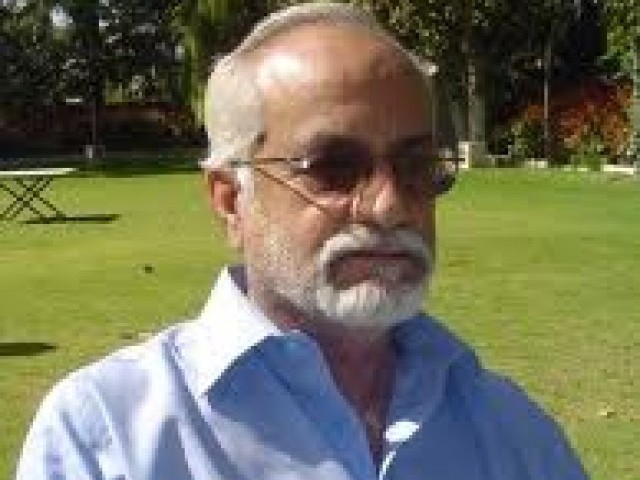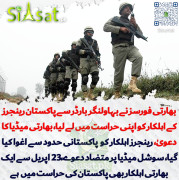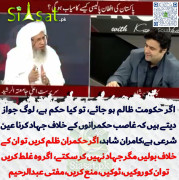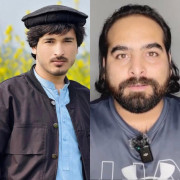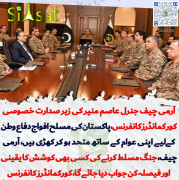M Ali Khan
Minister (2k+ posts)
Obituary: Farewell Comrade Chakar Khan

Added by Malik Siraj Akbar on October 31, 2012.
Saved under Malik Siraj Akbar, OPINION, Showcase
Tags: Asad Rahman, Asad Rahman in Balochistan, London Group, Malik Siraj Akbar, Sungi Development Foundation, The Baloch Hal
By Malik Siraj Akbar
What do people normally do after finishing a contemporary history book? Here is what I normally: I question myself how many of the lead characters in the book are still alive and where they currently live. In the same fashion, I, some years back, wondered how many members of the London Group still lived after reading a couple of books on Balochistan. In the summer of 2008, I read a passionate interview of Asad Rahman in The News on Sunday. ”Their [of Baloch people] backs against the wall, they’ve no option but to fight’, the headline read. I kept on reading the fascinating interview. I was struck by two things. One, Asad was open to talk to the media and, secondly, he impressed me with his knowledge and understanding of Balochistan.
There began my search for Asad Rahman, the wonderful friend of Balochistan who departed from this world on October 29th in Lahore. R.I.P. The search for him was over only one year later in October 2009 when the Human Rights Commission of Pakistan and Sungi Development Foundation brought two different delegations to Quetta to investigate the causes and implications of Balochistan conflict. friend, Faisal Mengal, who worked for Strengthening Participatory Organization (S.P.O.) and was subsequently killed in Karachi two years later, called. “There is a man you must meet,” he recommended, “Asad Rahman is in town and you should speak to him.”
When I met Asad at Quetta’s Sarena Hotel, I thought my Google search was sufficient to recognize him in the first meeting. When I walked at him, I suddenly stopped. Not because he was talking to someone else but because he was speaking in fluent Balochi. I thought I had spotted the wrong person. To end my confusion, Faisal said the bearded man was indeed Asad Rahman. I introduced myself and requested for an interview, he agreed and suggested I visit him the next day at S.P.O. office in Jinnah Town.
———————————————–
“I am ready to give you an interview,” he said, “but no one will publish it.”
I said I was more interested to dig out all information from him about his participation in the Balochistan movement. So, I was planning to speak in detail with him, without being sure how much he would trust me to open his heart. I wanted the interview to straighten important facts about Balochistan’s history instead of only getting it published in a newspaper. Thus, we agreed to publish the interview on my blog. We spoke for two-long days. Before publishing the interview, I asked him time and again, “are you sure you want this to go on record?” . Most of the time, he said if I wanted his interview to be a part of the history then I should publish it without editing most of the contents even if they are critical of some people.
The interview was published.
There were four immediate reactions.
First, it annoyed some members of the London Group. They thought Asad was too outspoken and did not utter good words for some members of the Group. I offered to interview the irked members of the London Group who objected to Asad’s remarks. No one agreed.
Second, members of the London Group also thought the interview was too self-serving. One man who fought in Balochistan said, “It was all actually collective work. We all worked together.”
Third, the interview became super-popular with young Baloch readers. It became a major motivator even for those who did not have an interest in Balochistan’s politics.
For instance, one day I met a friend, a senior Baloch bureaucrat currently working at the Chief Minister Secretariat, with nearly a dozen books: All on Balochistan’s history. ”Are you planning to write a book on Balochistan?” I asked sarcastically. “No,” he said, “I read your interview with Asad Rahman and was left motionless when he said Balochs should read and write their own history. I had never thought of reading my own history but Asad’s interview has compelled me to read the true history of Balochistan.” In the coming days, I met so many Baloch and non-Baloch, both from and outside Balochsitan, who said the interview had instilled an interest to read more about Balochistan. Daily Tawar, an Urdu language newspaper, published the interview in Urdu, Balochi and Bhravi languages. The interview, on October 30th, remained my most-read piece a in a single day throughout my blogging career.
Fourth, the interview was read by a lot of old people who had retired and shifted outside Balochistan or Pakistan. We received an enormous number of emails and phone calls from old friends and class fellows of the London Group. One gentleman, who had remained a class fellow of Dilip Dass, the member of the group how was killed during the Balochistan resistance battle, even sent us a picture from the school days which we exclusively published in the Baloch Hal. We eventually took the picture down on the sender’s request who feared coming under limelight.
———————————————–
It is a cliche to say Asad was a friend of Balochistan. A “unique friend” is probably the right term to describe him. There have been very few people, and Asad was among them, who tried to help Balochistan with guns, conferences, signature campaigns, interviews and newspaper articles.
On June 11th and 12, 2010, Sungi Development Foundation, where he directed programs, organized a major conference on Balochistan. He wanted to bring all stakeholders in Balochistan at the conference. He invited powerful authorities like the Governor of Balochistan Nawab Zulfiqar Ali Magsi and Senator Raza Rabbani to tell them that the Aghaz-e-Haqooq-Balochistan Package had not helped to resolve the conflict in Balochistan.
Asad launched a massive signature campaign across Pakistan to express solidarity with the Baloch people. He was a brave man. He lived in Islamabad but never hesitated in publicly stating that he supported the Baloch right to self-determination.
In an email the Summer of 2011, he wrote to me, “I think you understand my commitment to the resolution of the Balochistan issue. I am trying my best, holding conferences and press conferences. The problem is the civilian government both at the federal and provincial level. They are both dictated to by the Khakis and are not able to shake off their hold.”
———————————————–
Asad shared three dreams with me.
One, he always wanted the Balochs to be united. I was surprised to see him to go to everyone’s home in Balochistan. His friends and contacts included pro-independence leaders, pro-autonomy parties and Baloch bureaucrats, doctors and journalists. He spoke to all and urged them to unite. He tired hard to bring them together on minimum points.
Two, he wished the Balochs educated their children. In every meeting, he’d say Balochs should sit down and write their own history. He never trusted Pakistani journalists and writers’ account on Balochistan. He considered most of them ignorant of and dishonest toward Balochistan.
Three, he wanted his children and nephews to neither forget Balochistan nor break up the relationship with the Baloch people. He often used to visit Balochistan with the family kids. He once told me he had taught his children Balochi language and wanted them to remain acquainted with the land their father loved so much.
———————————————–
If The Baloch Hal was my baby, Asad was the uncle.
“How is the Hal doing?” was his frequent question.
He was excited when we launched this newspaper in November 2010. He often offered to make personal donations to sustain the newspaper as he said “this work is very important’. He was working on his autobiography and had almost completed it. One day he shared the sad news, though: “My laptop has been stolen,” he wrote in an email, “I have lost the book manuscript. I will have to rewrite it.” I am not sure he ever got the time to work his autobiography. What a loss if he did not. His family can confirm the fate of the book.
Asad was in fact the only senior contributor for the Baloch Hal who agreed to give his exclusive articles and research papers to us for publication. We apologized that we did not have the funds to pay him for his writings. He said it was never an issue.
“Keep going,” he advised.
Added by Malik Siraj Akbar on October 31, 2012.
Saved under Malik Siraj Akbar, OPINION, Showcase
Tags: Asad Rahman, Asad Rahman in Balochistan, London Group, Malik Siraj Akbar, Sungi Development Foundation, The Baloch Hal
By Malik Siraj Akbar
What do people normally do after finishing a contemporary history book? Here is what I normally: I question myself how many of the lead characters in the book are still alive and where they currently live. In the same fashion, I, some years back, wondered how many members of the London Group still lived after reading a couple of books on Balochistan. In the summer of 2008, I read a passionate interview of Asad Rahman in The News on Sunday. ”Their [of Baloch people] backs against the wall, they’ve no option but to fight’, the headline read. I kept on reading the fascinating interview. I was struck by two things. One, Asad was open to talk to the media and, secondly, he impressed me with his knowledge and understanding of Balochistan.
There began my search for Asad Rahman, the wonderful friend of Balochistan who departed from this world on October 29th in Lahore. R.I.P. The search for him was over only one year later in October 2009 when the Human Rights Commission of Pakistan and Sungi Development Foundation brought two different delegations to Quetta to investigate the causes and implications of Balochistan conflict. friend, Faisal Mengal, who worked for Strengthening Participatory Organization (S.P.O.) and was subsequently killed in Karachi two years later, called. “There is a man you must meet,” he recommended, “Asad Rahman is in town and you should speak to him.”
When I met Asad at Quetta’s Sarena Hotel, I thought my Google search was sufficient to recognize him in the first meeting. When I walked at him, I suddenly stopped. Not because he was talking to someone else but because he was speaking in fluent Balochi. I thought I had spotted the wrong person. To end my confusion, Faisal said the bearded man was indeed Asad Rahman. I introduced myself and requested for an interview, he agreed and suggested I visit him the next day at S.P.O. office in Jinnah Town.
———————————————–
“I am ready to give you an interview,” he said, “but no one will publish it.”
I said I was more interested to dig out all information from him about his participation in the Balochistan movement. So, I was planning to speak in detail with him, without being sure how much he would trust me to open his heart. I wanted the interview to straighten important facts about Balochistan’s history instead of only getting it published in a newspaper. Thus, we agreed to publish the interview on my blog. We spoke for two-long days. Before publishing the interview, I asked him time and again, “are you sure you want this to go on record?” . Most of the time, he said if I wanted his interview to be a part of the history then I should publish it without editing most of the contents even if they are critical of some people.
The interview was published.
There were four immediate reactions.
First, it annoyed some members of the London Group. They thought Asad was too outspoken and did not utter good words for some members of the Group. I offered to interview the irked members of the London Group who objected to Asad’s remarks. No one agreed.
Second, members of the London Group also thought the interview was too self-serving. One man who fought in Balochistan said, “It was all actually collective work. We all worked together.”
Third, the interview became super-popular with young Baloch readers. It became a major motivator even for those who did not have an interest in Balochistan’s politics.
For instance, one day I met a friend, a senior Baloch bureaucrat currently working at the Chief Minister Secretariat, with nearly a dozen books: All on Balochistan’s history. ”Are you planning to write a book on Balochistan?” I asked sarcastically. “No,” he said, “I read your interview with Asad Rahman and was left motionless when he said Balochs should read and write their own history. I had never thought of reading my own history but Asad’s interview has compelled me to read the true history of Balochistan.” In the coming days, I met so many Baloch and non-Baloch, both from and outside Balochsitan, who said the interview had instilled an interest to read more about Balochistan. Daily Tawar, an Urdu language newspaper, published the interview in Urdu, Balochi and Bhravi languages. The interview, on October 30th, remained my most-read piece a in a single day throughout my blogging career.
Fourth, the interview was read by a lot of old people who had retired and shifted outside Balochistan or Pakistan. We received an enormous number of emails and phone calls from old friends and class fellows of the London Group. One gentleman, who had remained a class fellow of Dilip Dass, the member of the group how was killed during the Balochistan resistance battle, even sent us a picture from the school days which we exclusively published in the Baloch Hal. We eventually took the picture down on the sender’s request who feared coming under limelight.
———————————————–
It is a cliche to say Asad was a friend of Balochistan. A “unique friend” is probably the right term to describe him. There have been very few people, and Asad was among them, who tried to help Balochistan with guns, conferences, signature campaigns, interviews and newspaper articles.
On June 11th and 12, 2010, Sungi Development Foundation, where he directed programs, organized a major conference on Balochistan. He wanted to bring all stakeholders in Balochistan at the conference. He invited powerful authorities like the Governor of Balochistan Nawab Zulfiqar Ali Magsi and Senator Raza Rabbani to tell them that the Aghaz-e-Haqooq-Balochistan Package had not helped to resolve the conflict in Balochistan.
Asad launched a massive signature campaign across Pakistan to express solidarity with the Baloch people. He was a brave man. He lived in Islamabad but never hesitated in publicly stating that he supported the Baloch right to self-determination.
In an email the Summer of 2011, he wrote to me, “I think you understand my commitment to the resolution of the Balochistan issue. I am trying my best, holding conferences and press conferences. The problem is the civilian government both at the federal and provincial level. They are both dictated to by the Khakis and are not able to shake off their hold.”
———————————————–
Asad shared three dreams with me.
One, he always wanted the Balochs to be united. I was surprised to see him to go to everyone’s home in Balochistan. His friends and contacts included pro-independence leaders, pro-autonomy parties and Baloch bureaucrats, doctors and journalists. He spoke to all and urged them to unite. He tired hard to bring them together on minimum points.
Two, he wished the Balochs educated their children. In every meeting, he’d say Balochs should sit down and write their own history. He never trusted Pakistani journalists and writers’ account on Balochistan. He considered most of them ignorant of and dishonest toward Balochistan.
Three, he wanted his children and nephews to neither forget Balochistan nor break up the relationship with the Baloch people. He often used to visit Balochistan with the family kids. He once told me he had taught his children Balochi language and wanted them to remain acquainted with the land their father loved so much.
———————————————–
If The Baloch Hal was my baby, Asad was the uncle.
“How is the Hal doing?” was his frequent question.
He was excited when we launched this newspaper in November 2010. He often offered to make personal donations to sustain the newspaper as he said “this work is very important’. He was working on his autobiography and had almost completed it. One day he shared the sad news, though: “My laptop has been stolen,” he wrote in an email, “I have lost the book manuscript. I will have to rewrite it.” I am not sure he ever got the time to work his autobiography. What a loss if he did not. His family can confirm the fate of the book.
Asad was in fact the only senior contributor for the Baloch Hal who agreed to give his exclusive articles and research papers to us for publication. We apologized that we did not have the funds to pay him for his writings. He said it was never an issue.
“Keep going,” he advised.
Published in The Baloch Hal on October 31, 2012
[h=1]Asad Rahman, aka Chakar Khan, 62, Passes Away[/h]
[h=1]Asad Rahman, aka Chakar Khan, 62, Passes Away[/h]
Added by FB_1661948314 on October 30, 2012.
Saved under Showcase, Today in News, Top Headlines
Tags: Asad Rahman, Chakar Khan, London Group Balochistan, Shiek Asad Rehman
The Baloch Hal News QUETTA: Asad Rahman, 62, a renowned intellectual, social activist and ardent supporter of Baloch movement, passed away on Tuesday, media report.Son of a former chief justice of Pakistan Supreme Court, Mr. Rahman had advocated for Baloch rights throughout his life. In 1970s, Mr. Rahman was part of the London Group, a study circle in England that later left their comfort life and education to join Baloch fighters in Marri hills, confronting a fierce military operation.Other prominent members of the London Group were Najam Sethi, Ahmed Rashid, Rashid Rahman and Dilip Dass. Another prominent figure, Mohammad Ali Talpur, joined the group a year later.In early September, Mr. Rahman, along with his 30-year-old son, were manhandled by Punjab Police in front of their residence in Lahore after they had tried to save life of a rickshaw driver who had sustained injury in a road accident. According to a report in the Daily Times, a liberal English daily edited by Mr. Ramhan’s elder brother, Rashid Rahman, both father and son had badly been injured by the Punjab Police.An activist on Facebook alleged that Mr. Rahman couldn’t bear the humiliation and ill-treatment by Punjab Police and had fallen ill in the wake of the police beating.His funeral prayers will be offered tomorrow in Lahore.
QUETTA: Asad Rahman, 62, a renowned intellectual, social activist and ardent supporter of Baloch movement, passed away on Tuesday, media report.Son of a former chief justice of Pakistan Supreme Court, Mr. Rahman had advocated for Baloch rights throughout his life. In 1970s, Mr. Rahman was part of the London Group, a study circle in England that later left their comfort life and education to join Baloch fighters in Marri hills, confronting a fierce military operation.Other prominent members of the London Group were Najam Sethi, Ahmed Rashid, Rashid Rahman and Dilip Dass. Another prominent figure, Mohammad Ali Talpur, joined the group a year later.In early September, Mr. Rahman, along with his 30-year-old son, were manhandled by Punjab Police in front of their residence in Lahore after they had tried to save life of a rickshaw driver who had sustained injury in a road accident. According to a report in the Daily Times, a liberal English daily edited by Mr. Ramhan’s elder brother, Rashid Rahman, both father and son had badly been injured by the Punjab Police.An activist on Facebook alleged that Mr. Rahman couldn’t bear the humiliation and ill-treatment by Punjab Police and had fallen ill in the wake of the police beating.His funeral prayers will be offered tomorrow in Lahore.
Saved under Showcase, Today in News, Top Headlines
Tags: Asad Rahman, Chakar Khan, London Group Balochistan, Shiek Asad Rehman
The Baloch Hal News
 QUETTA: Asad Rahman, 62, a renowned intellectual, social activist and ardent supporter of Baloch movement, passed away on Tuesday, media report.Son of a former chief justice of Pakistan Supreme Court, Mr. Rahman had advocated for Baloch rights throughout his life. In 1970s, Mr. Rahman was part of the London Group, a study circle in England that later left their comfort life and education to join Baloch fighters in Marri hills, confronting a fierce military operation.Other prominent members of the London Group were Najam Sethi, Ahmed Rashid, Rashid Rahman and Dilip Dass. Another prominent figure, Mohammad Ali Talpur, joined the group a year later.In early September, Mr. Rahman, along with his 30-year-old son, were manhandled by Punjab Police in front of their residence in Lahore after they had tried to save life of a rickshaw driver who had sustained injury in a road accident. According to a report in the Daily Times, a liberal English daily edited by Mr. Ramhan’s elder brother, Rashid Rahman, both father and son had badly been injured by the Punjab Police.An activist on Facebook alleged that Mr. Rahman couldn’t bear the humiliation and ill-treatment by Punjab Police and had fallen ill in the wake of the police beating.His funeral prayers will be offered tomorrow in Lahore.
QUETTA: Asad Rahman, 62, a renowned intellectual, social activist and ardent supporter of Baloch movement, passed away on Tuesday, media report.Son of a former chief justice of Pakistan Supreme Court, Mr. Rahman had advocated for Baloch rights throughout his life. In 1970s, Mr. Rahman was part of the London Group, a study circle in England that later left their comfort life and education to join Baloch fighters in Marri hills, confronting a fierce military operation.Other prominent members of the London Group were Najam Sethi, Ahmed Rashid, Rashid Rahman and Dilip Dass. Another prominent figure, Mohammad Ali Talpur, joined the group a year later.In early September, Mr. Rahman, along with his 30-year-old son, were manhandled by Punjab Police in front of their residence in Lahore after they had tried to save life of a rickshaw driver who had sustained injury in a road accident. According to a report in the Daily Times, a liberal English daily edited by Mr. Ramhan’s elder brother, Rashid Rahman, both father and son had badly been injured by the Punjab Police.An activist on Facebook alleged that Mr. Rahman couldn’t bear the humiliation and ill-treatment by Punjab Police and had fallen ill in the wake of the police beating.His funeral prayers will be offered tomorrow in Lahore.
Last edited:

